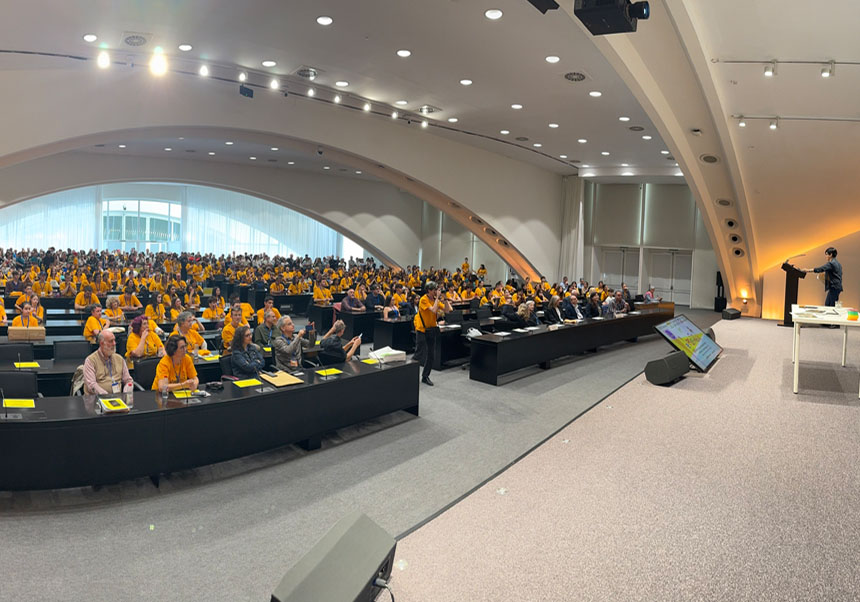
The Science Museum of Valencia has hosted this Sunday, April 21, between 10 a.m. and 1 p.m. the 19th Experimenta Fair-Competition of Experiments and Demonstrations of Physics and Technology, with the attendance of 3,000 people. The event, organised by the Faculty of Physics of the University of Valencia (UV), is a science festival that brings together thousands of people every year and introduces physics and technology to secondary school students and the general public in a creative and participatory way.
Experimenta, which has the collaboration of the Spanish Foundation for Science and Technology of the Ministry of Science, Innovation and Universities, among other entities, has more than 70 stands, with different experimental STEM projects developed by groups of ESO and baccalaureate students, with the help of their teachers, a total of more than 300 participants who made their work known to the public during the 3 hours of the fair.
After the fair, at 1:30 p.m. the awards ceremony was held in the Santiago Grisolía Auditorium of the Museum, which was streamed on the museum’s YouTube channel, with more than 10,000 subscribers. The act was preceded by the short scientific show “Màgia o física?”, by first-year Physics students, specifically Roser Forment and Miguel Hernández, who are also members of the Photonets group.
The award-winning projects in the 2024 19th Experimenta fair-competition awarded by the jury were, in the Physics Experiments and Demonstrations category, the one from IES Veles e Vents (Gandía), with “Give me a point of support and I will solve second grade equations” regarding the ESO and the British School Alzira (“Visualization of Bohr’s electrons: stationary waves in rings”) of baccalaureate. In the Technology Applications category, the awarded centres were the Gençana of Godella educational centre (“Space-time capsule”) in ESO and the IES de Moixent (“Rocket 2.0”) in baccalaureate.
Before knowing the results of the competition, recognition was given to the international participation of three high school groups from the Uddevalla Gymnasieskola in Vätra Göttaland, Sweden, who have participated in the fair with physics projects. Then, the award-winning projects were announced, with prizes for the participants and gifts for the teachers and all the participating groups that received 11 honourable mentions. The jury, made up of university and secondary school teachers, valued the good functioning, the correct understanding of the tasks and the clarity of their explanations.
An additional prize for all groups is the invitation to exhibit their projects at EXPERIMENTA TOP coinciding with Expociencia on May 11, and the videos that will be recorded with their explanation and that will be deposited online as open teaching materials for dissemination. As a novelty, this year the financial endowment of the prizes increases: the four of the jury reach €600 for a group of four participants (€150/participant).
At the table that awarded the prizes and diplomas were Mª Isabel Vázquez, vice-rector of Studies at the UV: Ana Mª Ortells, general director of the City of Arts and Sciences; Enric Valor, dean of the Faculty of Physics of the UV; Núria Rius, director of the Corpuscular Physics Institute (IFIC), CSIC-UV joint centre; Mariam Tórtola, president of the local section of the Real Spanish Physical Society; Sergi Serrano, president of the Association of Technology Teachers of the Valencian Community (APTCV) and Jordi Vidal, coordinator of the Juries.
The organising committee of the Experimenta fair-competition includes Chantal Ferrer Roca, professor in the Department of Applied Physics and Electromagnetism of the UV and coordinator of the fair-competition, professors Jordi Vidal Perona and Miguel V. Andrés Bou and professor Amparo Pons Martí.
Experimenta was born in 2005 with the aim of involving students in the World Year of Physics in an active and creative way. The extraordinary enthusiasm of contestants and visitors in this first call helped make it an annual event.
This initiative has a competitive project from the Spanish Foundation for Science and Technology of the Ministry of Science, Innovation and Universities (FECYT-MICIN), in addition to the collaboration of other entities, such as the Science Museum of Valencia, the City Council of Valencia or the Royal Spanish Physics Society. On the part of the University of Valencia, it is supported by the Corpuscular Physics Institute (IFIC), the Scientific Culture and Innovation Unit (UCC+i), the Delegation for Incorporation to the UV, the Sanchis Guarner Training and Quality Centre, the Equality Unit, the Archimedes and Expociència Physics Working Group.
More information about Experimenta:
https://ir.uv.es/experimenta/feria
https://ir.uv.es/experimenta/fira
Images:





